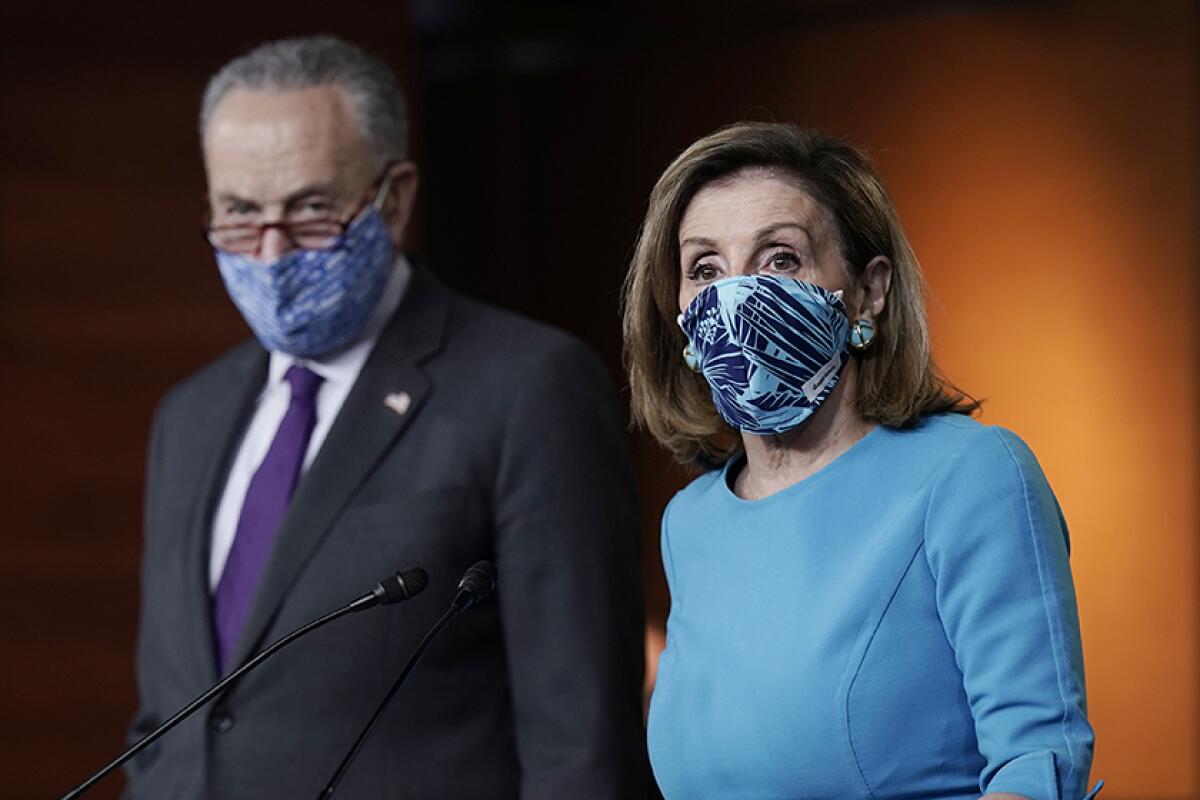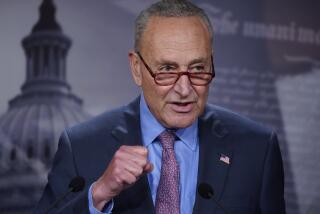Democrats struggle to get Biden’s plan back on track

- Share via
WASHINGTON — Democrats’ plan to enact an ambitious remodel of the nation’s social safety net programs is facing new hurdles on Capitol Hill amid deep divisions over the scope of the package, its cost and what can be included under the Senate’s stringent rules.
The conflict jeopardizes President Biden’s entire “Build Back Better” legislative agenda, which includes an approximately $1-trillion bipartisan infrastructure package already passed by the Senate.
The fight comes as lawmakers also muddle toward key deadlines to fund the government in nine days and avert a default on the nation’s debt by next month. Late Tuesday night, the House approved a bill to address both issues but the legislation faces fierce opposition among Senate Republicans, leaving no clear path to resolution.
“We’re at the moment of truth here, and the clock’s ticking and we’ve got to find a way to get everybody on the same page,” said Sen. Chris Van Hollen (D-Md.) after Senate Democrats huddled behind closed doors Tuesday.
He and other senators said Democrats weren’t yet trying to hash out policy differences. Their meeting was about getting Democrats to understand the need to come together.
Democratic leaders appear to be using sheer force of will to move the plan, daring rank-and-file members to vote against a bill that advances many of the campaign pledges the party has made for years. Given the slim margins Democrats hold in Congress, each senator — and any group of four House members — holds the ability to kill the bill.
“I’ve been herding cats now for four months or so,” said Rep. John Yarmuth (D-Ky.), who leads the House committee that will be responsible for combining several committees’ work into one bill.
Though he previously encouraged fellow Democrats to fight for what they wanted, he said they should now prepare to unite around the final version.
“Ultimately you’re all gonna vote for this, because you’re not gonna vote against child care, you’re not gonna vote against paid family leave, and yada, yada, yada. And by the way, have you met Nancy?” he said, referring to Speaker Nancy Pelosi (D-San Francisco) and her record of getting Democratic priorities through the House.
While much of the public debate has been over the overall price of the bill — now set at $3.5 trillion — some Democrats are trying to flip the discussion into first deciding what policy should be included.
“If we can agree on the programs, then we can talk about how much money we’re going to put in each of the items. But that is, to me, one of the major things we’ve got to nail down, and we’re not quite there yet,” said Sen. Mazie Hirono (D-Hawaii).
Democrats have long said they would enact the Biden plan along two tracks: one bipartisan plan to restore roads and bridges and expand broadband internet, and a second social spending plan supported only by Democrats. It would expand Medicare, Medicaid and the Affordable Care Act; attempt to slow climate change; and provide paid family leave, child care subsidies, free nationwide pre-K and free community college.
But the two tracks are closely linked. House progressives have threatened to kill the bipartisan infrastructure plan if they don’t get the social spending plan. Moderates have prioritized passing the infrastructure bill first, and demanded a House vote on the package by Sept. 27, regardless of whether the spending bill is ready.
The two-track process could come to a head as soon as Monday, the vote deadline agreed to in a deal between moderates and Pelosi. Few expect the spending plan to be ready by then.
Rep. Pramila Jayapal (D-Wash.), leader of the Congressional Progressive Caucus, said she reiterated her group’s position to Pelosi on Tuesday and predicted the vote would be delayed. Rep. Josh Gottheimer (D-N.J.), a leader of the centrist faction, separately said leaders assured him the vote would be held as scheduled.
Senate Majority Leader Charles E. Schumer (D-N.Y.) said Tuesday that he and other senators plan to finish work on the social spending bill “as soon as we can, hopefully by the 27th.”
House Majority Leader Steny H. Hoyer (D-Md.) warned against a progressive revolt.
“When you’re in a foxhole, and you need every possible person in that foxhole to help you win the battle,” Hoyer said, “not cooperating with one another in accomplishing those objectives, I think, is not helpful.”
Pelosi has begun preparing House Democrats for the prospect that the social safety net bill would be pared down from $3.5 trillion. She said it would change to comply with the “Byrd rule” in the Senate governing what can be passed under the special budget reconciliation procedure Democrats are using to enact it, and to ensure there are enough votes among Senate Democrats.
“We must be prepared for adjustments according to the Byrd rule and an agreed to” price tag, Pelosi wrote to fellow Democrats.
But as House Democrats wait, Senate Democrats appear no closer to coming to consensus. Sens. Joe Manchin III of West Virginia and Kyrsten Sinema of Arizona have been the most outspoken centrists with concerns about the bill. But they are not alone.
For instance, another group of centrist Democrats, led by Rep. Scott Peters (D-San Diego), opposes the plan’s requirement that prescription drugmakers negotiate with Medicare on their prices. Other policy divisions exist over whether to expand Medicare or the Affordable Care Act’s subsidies.
Democrats faced a setback over the weekend when a key Senate official said a plan to provide a path to citizenship to millions of immigrants would not comply with rules governing the reconciliation process.
Democrats say they will go back to the official with an alternative plan, but resolution is not expected for several more days.
Times staff writer Sarah D. Wire contributed to this report.
More to Read
Get the L.A. Times Politics newsletter
Deeply reported insights into legislation, politics and policy from Sacramento, Washington and beyond. In your inbox three times per week.
You may occasionally receive promotional content from the Los Angeles Times.











